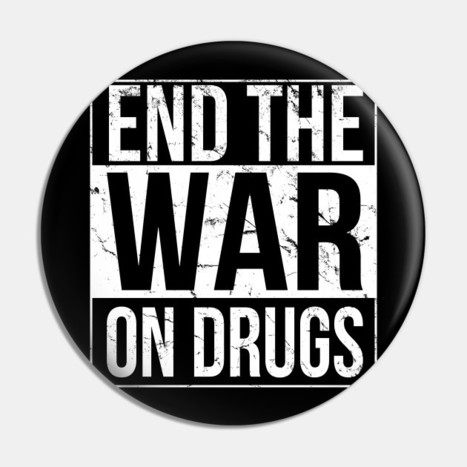[Opinion ofAlexander Soros is the Deputy Chairman of the Open Society Foundations. Follow him on Twitter: @AlexanderSoros]
Fifty years ago this month, the United States launched a war on its own people. President Richard Nixon declared drug abuse “public enemy number one.” Since then, our criminal approach to drugs has devastated lives, destroyed communities, and led to the largest prison population in the world.
Over the past half-century, the drug war has driven a well-documented surge in police budgets and incarceration. Law enforcement agencies now make more than 1.6 million arrests each year for drug possession alone. Human Rights Watch documents that every 25 seconds in the United States, someone is arrested for the simple act of possessing drugs for their personal use.
From its inception, the war on drugs, has fueled institutional and structural racism and fuels the prison industrial complex, mass incarceration, and police brutality.
According to the American Civil Liberties Union, Black people are almost four times as likely as white people to be arrested on marijuana charges, despite similar rates of consumption. The war on drugs has turned even the suspicion of substance use into an excuse for deadly force. A no-knock search warrant — a tactic frequently justified by the assertion that drug suspects pose an inherent danger — led to the killing of Breonna Taylor. As George Floyd was being murdered, an officer nonchalantly told onlookers, “This is why you don’t do drugs, kids.”
Lost in this litany of destruction is the clear fact that the war on drugs has failed in its aim to combat harmful substance use and to save lives. Drug use has continued to increase. Nearly 500,000 people died in the U.S. alone from opioid overdose from 1999 to 2019. Last year, overdose deaths surpassed even COVID-19 fatalities in some cities. But decades of being targeted by law enforcement has pushed drug users, who fear criminal prosecution, further into the shadows. The policing of illicit substance use makes seeking healthcare risky, depriving users of essential services that can be life-saving. It also results in catastrophic harm to civil society.
But today, lawmakers have a chance to chart a new path. That means moving away from criminalization and incarceration, toward evidence-based interventions that treat drug use like the public health issue it is.
One practical step in this direction: Make permanent the temporary permission, granted in response to the COVID-19 pandemic, that allows people to take methadone, used for treatment of opioid use disorder, in their homes, rather than be forced to line up every day for their medicine. Officials should also expand syringe service programs, get more naloxone into the hands of drug users, and permit the opening of overdose prevention centers, where people can use drugs under the supervision of trained staff and without fear of arrest.
We have an opportunity to develop a national approach to drugs that reimagines what it means to have safe communities, and that finally puts people first. We will never achieve police reform and racial justice in America if the war on drugs is allowed to continue. We must learn the lessons of our fifty-year failure and use this moment of reflection for action.



 Your new post is loading...
Your new post is loading...









https://globalefarmacia.com/Prodotto/acquista-ozempic-online/
https://globalefarmacia.com/Prodotto/acquista-victoza-online/
https://globalefarmacia.com/Prodotto/acquista-mounjaro-online/
https://globalefarmacia.com/Prodotto/acquista-mysimba-online/
https://globalefarmacia.com/Prodotto/acquista-wegovy-online/
https://globalefarmacia.com/Prodotto/acquistare-saxenda-6mg-ml-online/
https://globalefarmacia.com/Prodotto/acquista-phentermine-online/
https://globalefarmacia.com/Prodotto/acquistare-sibutramina-online/
https://globalefarmacia.com/Prodotto/ephedrine-hcl-30mg/
https://globalefarmacia.com/Prodotto/acquista-adderall-30mg/
https://globalefarmacia.com/Prodotto/acquista-adipex-online/
https://globalefarmacia.com/Prodotto/acquista-vyvanse-online/
https://globalefarmacia.com/Prodotto/acquista-ossicodone-online/
https://globalefarmacia.com/Prodotto/acquista-oxycontin-online/
https://globalefarmacia.com/Prodotto/acquista-percocet-online/
https://globalefarmacia.com/Prodotto/acquista-stilnox-online/
https://globalefarmacia.com/Prodotto/acquista-suboxone-8mg/
https://globalefarmacia.com/Prodotto/acquista-subutex-online/
https://globalefarmacia.com/Prodotto/acquista-metadone/
https://globalefarmacia.com/Prodotto/acquista-botox-online/
https://globalefarmacia.com/Prodotto/acquistare-rohypnol-2mg/
https://globalefarmacia.com/Prodotto/acquista-l-ritalin-online/
https://globalefarmacia.com/Prodotto/acquista-adma-online/
https://globalefarmacia.com/Prodotto/a-215-ossicodone-actavis/
https://globalefarmacia.com/Prodotto/acquista-ativan-online/
https://globalefarmacia.com/Prodotto/acquista-cerotti-al-fentanil/
https://globalefarmacia.com/Prodotto/acquista-codeina-linctus-online/
https://globalefarmacia.com/Prodotto/acquista-codeina-online/
https://globalefarmacia.com/Prodotto/acquista-demerol-online/
https://globalefarmacia.com/Prodotto/acquista-depalgo-online/
https://globalefarmacia.com/Prodotto/acquista-diazepam-online/
https://globalefarmacia.com/Prodotto/acquista-dilaudid-8mg/
https://globalefarmacia.com/Prodotto/acquista-endocet-online/
https://globalefarmacia.com/Prodotto/acquista-eroina-bianca/
https://globalefarmacia.com/Prodotto/acquista-opana-online/
https://globalefarmacia.com/Prodotto/acquista-vicodin-online/
https://globalefarmacia.com/Prodotto/acquista-xanax-2mg/
https://globalefarmacia.com/Prodotto/efedrina-hcl-in-polvere/
https://globalefarmacia.com/Prodotto/sciroppo-di-metadone/
https://globalefarmacia.com/Prodotto/tramadolo-hcl-200mg/
<a href="https://globalefarmacia.com/Prodotto/acquista-ozempic-online/">acquista-ozempic-online</a>;
<a href="https://globalefarmacia.com/Prodotto/acquista-victoza-online/">acquista-victoza-online</a>;
<a href="https://globalefarmacia.com/Prodotto/acquista-mounjaro-online/">acquista-mounjaro-online</a>;
<a href="https://globalefarmacia.com/Prodotto/acquista-mysimba-online/">acquista-mysimba-online</a>;
<a href="https://globalefarmacia.com/Prodotto/acquista-wegovy-online/">acquista-wegovy-online</a>;
<a href="https://globalefarmacia.com/Prodotto/acquistare-saxenda-6mg-ml-online/">acquistare-saxenda-6mg-ml-online</a>;
<a href="https://globalefarmacia.com/Prodotto/acquista-phentermine-online/">acquista-phentermine-online</a>;
<a href="https://globalefarmacia.com/Prodotto/ephedrine-hcl-30mg/">ephedrine-hcl-30mg</a>;
<a href="https://globalefarmacia.com/Prodotto/acquista-ossicodone-online/">acquista-ossicodone-online</a>;
<a href="https://globalefarmacia.com/Prodotto/acquista-oxycontin-online/">acquista-oxycontin-online</a>;
<a href="https://globalefarmacia.com/Prodotto/acquista-percocet-online/">acquista-percocet-online</a>;
<a href="https://globalefarmacia.com/Prodotto/acquista-stilnox-online/">acquista-stilnox-online</a>;
<a href="https://globalefarmacia.com/Prodotto/acquista-suboxone-8mg/">acquista-suboxone-8mg</a>;
<a href="https://globalefarmacia.com/Prodotto/acquista-subutex-online/">acquista-subutex-online</a>;
<a href="https://globalefarmacia.com/Prodotto/acquista-metadone/">acquista-metadone</a>;
<a href="https://globalefarmacia.com/Prodotto/buy-vyvanse-online/">buy-vyvanse-online</a>;
<a href="https://globalefarmacia.com/Prodotto/a-215-ossicodone-actavis/">a-215-ossicodone-actavis</a>;
<a href="https://globalefarmacia.com/Prodotto/acquista-adderall-30mg/">acquista-adderall-30mg</a>;
<a href="https://globalefarmacia.com/Prodotto/acquista-adipex-online/">acquista-adipex-online</a>;
<a href="https://globalefarmacia.com/Prodotto/acquista-adma-online/">acquista-adma-online</a>;
<a href="https://globalefarmacia.com/Prodotto/acquista-ativan-online/">acquista-ativan-online</a>;
<a href="https://globalefarmacia.com/Prodotto/acquista-botox-online/">acquista-botox-online</a>;
<a href="https://globalefarmacia.com/Prodotto/acquista-cerotti-al-fentanil/">acquista-cerotti-al-fentanil</a>;
<a href="https://globalefarmacia.com/Prodotto/acquista-codeina-linctus-online/">acquista-codeina-linctus-online</a>;
<a href="https://globalefarmacia.com/Prodotto/acquista-codeina-online/">ta-codeina-online</a>;
<a href="https://globalefarmacia.com/Prodotto/acquista-demerol-online/">acquista-demerol-online</a>;
<a href="https://globalefarmacia.com/Prodotto/acquista-depalgo-online/">acquista-depalgo-online</a>;
<a href="https://globalefarmacia.com/Prodotto/acquista-diazepam-online/">acquista-diazepam-online</a>;
<a href="https://globalefarmacia.com/Prodotto/acquista-dilaudid-8mg/">acquista-dilaudid-8mg</a>;
<a href="https://globalefarmacia.com/Prodotto/acquista-endocet-online/">acquista-endocet-online</a>;
<a href="https://globalefarmacia.com/Prodotto/acquista-eroina-bianca/">acquista-eroina-bianca</a>;
<a href="https://globalefarmacia.com/Prodotto/acquista-l-ritalin-online/">acquista-l-ritalin-online</a>;
<a href="https://globalefarmacia.com/Prodotto/acquista-opana-online/">acquista-opana-online</a>;
<a href="https://globalefarmacia.com/Prodotto/acquista-vicodin-online/">acquista-vicodin-online</a>;
<a href="https://globalefarmacia.com/Prodotto/acquista-xanax-2mg/">acquista-xanax-2mg</a>;
<a href="https://globalefarmacia.com/Prodotto/acquistare-rohypnol-2mg/">acquistare-rohypnol-2mg</a>;
<a href="https://globalefarmacia.com/Prodotto/acquistare-sibutramina-online/">acquistare-sibutramina-online</a>;
<a href="https://globalefarmacia.com/Prodotto/efedrina-hcl-in-polvere/">efedrina-hcl-in-polvere</a>;
<a href="https://globalefarmacia.com/Prodotto/sciroppo-di-metadone/">sciroppo-di-metadone</a>;
<a href="https://globalefarmacia.com/Prodotto/tramadolo-hcl-200mg/">tramadolo-hcl-200mg</a>;